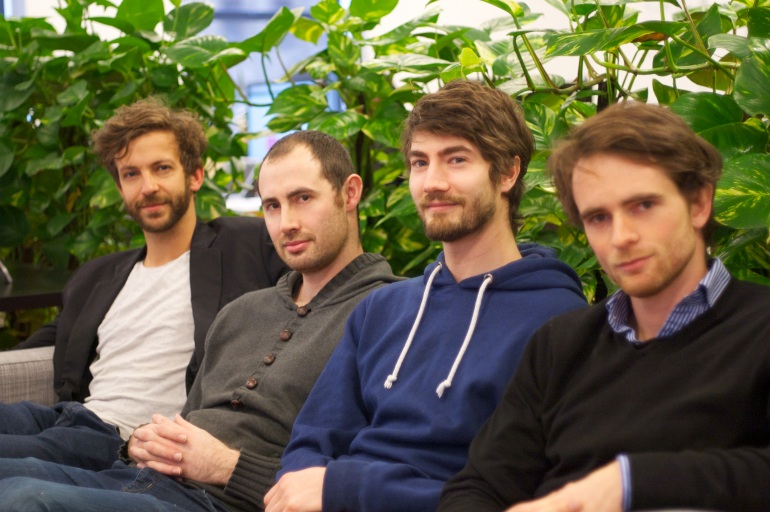The start-up giving Telstra's HealthEngine a run for its money

The HotDoc team: Simon Holland, Benjamin Hurst, John Servinis, Tomas Spacek. Source:supplied
In the summer of 2012, psychiatrist-turned novelist Benjamin Hurst was dreading the prospect of going home to Australia after living in the Big Apple for two years. He was finishing off his first novel while attending classes in creative writing.
He was looking for a way to stay in the US and turned to his friends for advice. One of those friends told Hurst to apply for a job at ZocDoc, an online medical appointment booking service.
He checked out the site and was immediately drawn to the business model, which allows patients to book medical appointments using a simple app on their smartphone. It also got his creative juices flowing. “This was a good idea that I could implement,” he told Technology Spectator. “It allows me to combine my creativity with my knowledge of the medical system.”
That night, he woke up at 4am and started drafting his first ever business plan. His decision to turn to business was also aided by the fact that he was surrounded by a vibrant group of entrepreneurial Australian expatriate community.
“I hated the course I was doing at the New School. I felt they were all faux artists, following a pipe dream,” he said. So instead of dreading the prospect of going home, he couldn’t wait to get on the next flight.
“I was very cognisant what a small window there was to make it happen and the idea was too damn obvious and damn good,” He said,” I went from not wanting to go back to Australia to really wanting to get back as soon as possible.”
Although he was armed with the business concept and a professional medical qualification, Hurst needed tech muscle to make the business idea fly. He was introduced to two young founders of Papercloud, a Melbourne-based software company, Simon Holland and Tomas Spacek.
Initially, he just wanted to understand the mechanics of building a mobile app and the cost. But Holland made a counterproposal to take equity in Hurst’s new venture, named HotDoc, in exchange for technical work.
The new company will provide round-the-clock access for patients to their doctors’ scheduling, either online or through a mobile application. This a compelling idea in an age when most of us spend considerable time staring at the mobile phone and manage everything from bank accounts to social media on it.
Hurst says this app would not only make life easier for patients by allowing them to book medical appointments online, it also allows receptionists at clinics to do their jobs more efficiently.
“We give them a way not to be beholden to the phone, which is an incredibly inefficient process for scheduling patient appointments,” he says.
He explains that the app can help clinics improve their front office productivity by 30 per cent..
Hurst’s first client was his mother, a practising GP. “As all supportive mothers do, though she was still hoping for me to become a paediatric neurosurgeon, she was happy to help out with the latest project and her exasperating son,” he says, with a wide grin.
The biggest technological hurdle for the new venture was to integrate the often arcane and code-based patient management systems used at clinics throughout Australia.
But once again, Hurst’s family came to the rescue. Many of his cousins, who are medical doctors, offered their different patient management systems as guinea pigs for him to test out his new software.
“Integrating is a good way of losing about three years of your life and it is profoundly challenging,” he said, “all these softwares are tremendously difficult and very glitchy, all sort of things can go wrong.”
After conquering the technical hurdle with assistance from his partners Holland, Spacek and John Servinis, the chief technology officer, Hurst needed to find clients outside of his family and friends. He aimed for the country’s large corporate operators of GP clinics to be early adopters of the product.
HotDoc had its first big win when they scored Healthscope, Australia’s third-largest operator of GP clinics this year. “It was not just about acquiring a new customer; it was about having to prove that our software was better than the previous software,” he said. HotDoc snatched the prized contract from arch-rival, HealthEngine, a start-up backed by telco giant Telstra.
Since then the company has gone from strength to strength and scored its biggest win to date by winning a contract to supply its product to the largest corporate GP clinic operator, Sonic Health. HotDoc’s market share increased 300 per cent on the day it signed the contract with Sonic Health. It went from serving 20 clinics last December to the more than 350 it serves today.
Hurst says HotDoc has roughly the same market share as Telstra-backed HealthEngine.
Despite scoring major corporate clients, the biggest challenge for HotDoc is to convince thousands of smaller and doctor-owned clinics to adopt their product. Hurst, a trained doctor who comes from a well-established medical family, is upbeat.
“Doctors are very hard to establish relationship with, but they are loyal customers,” he said.
Hurst believes new and innovative features are crucial in winning clients. The company unveiled a new product that allows patients to check in automatically when they are within a 100 metre radius of the clinic. “The moment that a patient enters that perimeter, it activates a push notification if it is within 15 minutes of his or her appointment,” he said.
It seems that Hurst’s Big Apple dream is coming true.















